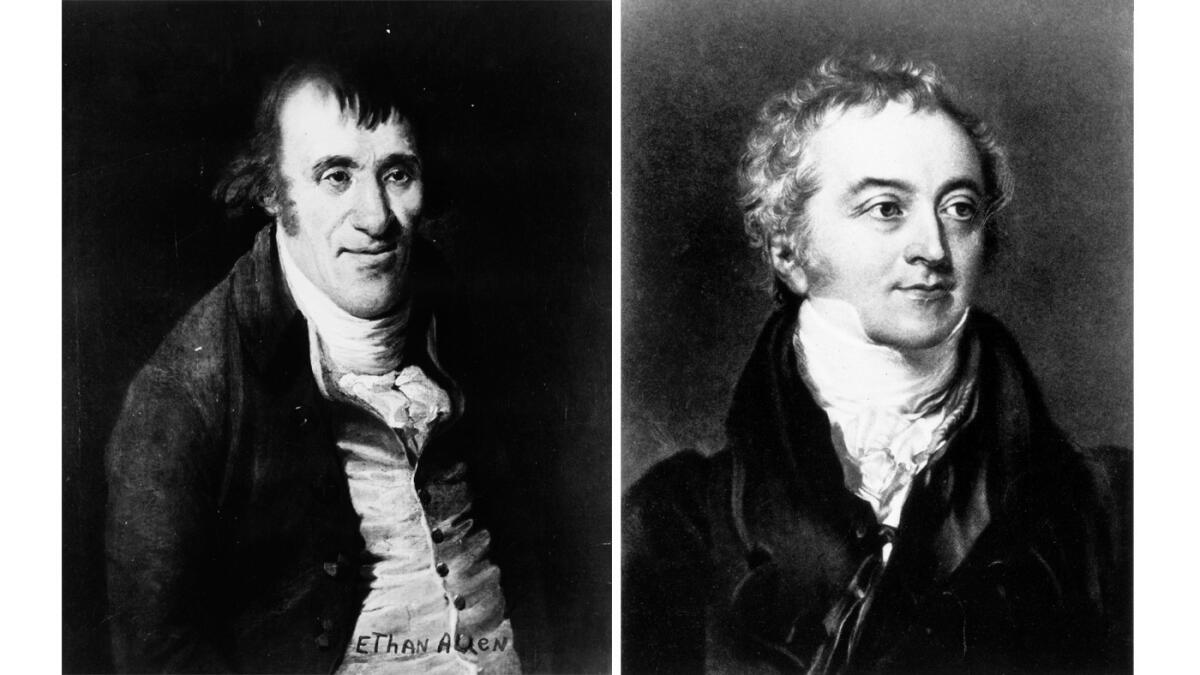Review: ‘Nature’s God’ explores ‘heretical origins’ of religion in U.S.

- Share via
Matthew Stewart wants to make one thing perfectly clear: The United States was not founded as a Christian nation. The principles that inspired the American Revolution, he argues in “Nature’s God: The Heretical Origins of the American Republic,” belong to an intellectual tradition dating to ancient Greece and reviled by every variety of Christian — early church fathers, Catholic clergy and Protestant divines alike.
Rooted in the philosophy of Epicurus, who saw happiness as the highest good, this tradition flowered in the 17th century to produce wide-ranging inquiries into the nature of God, humanity, religion and society that got Benedict de Spinoza labeled “the atheist Jew.” Meanwhile, the more circumspect John Locke (careful to mask his iconoclasm with boilerplate declarations of conventional piety) ended up praised by historians as “the single greatest intellectual influence on America’s revolutionaries.”
Yet Spinoza the radical, no less than Locke the moderate, shaped an agnostic world view that shook America loose from Britain. Stewart pays particular attention to two fire-breathers — Ethan Allen, surprise conqueror of Ft. Ticonderoga, and Thomas Young, instigator of the Boston Tea Party — as the most outspoken proponents of a heterodox creed shared by (at minimum) Thomas Jefferson, Benjamin Franklin and George Washington. Contemporaries called them deists when not calling them infidels or atheists, and Stewart devotes considerable care to explaining that Deism, the philosophical engine of the Revolution, is not the Christianity Lite some 21st century conservatives have proclaimed it.
“America’s revolutionary deists,” Stewart writes, “saw themselves as — and they were — participants in an international movement that drew on most of the same literary sources across the civilized world.” His detailed explication of those sources ranges from Epicurus and his Roman popularizer, Lucretius, through early modern Italian freethinkers Giordano Bruno and Lucilio Vanini (both executed at the stake for their apostasy) to the diverse array of English and French intellectuals reacting to Spinoza and Locke.
Yes, such forbidding terms as monism and creation ex nihilo are bandied about, but don’t be daunted. As in “The Courtier and the Heretic,” his earlier book about Spinoza and Gottfried Leibniz, Stewart does his intellectual heavy lifting in graceful prose that makes lucid the main thrust of dense arguments. Erudite witticisms lighten the mood: “Jefferson’s vision for the future of American religion … featured nothing but Unitarian churches from sea to shining sea.”
His main point is serious. The tradition the deists honored was opposed to the religious doctrines of their day, and they knew it. Epicurus asserted that nature operates according to laws that can be discovered and defined. As Copernicus and Galileo learned, discovering natural laws that contradicted Catholic dogma was a risky business, and Protestant sects were equally insistent on divine judgment as exempt from explanation.
Jefferson was one of many deists appalled by the Calvinist God, doling out salvation and damnation in a manner human beings must accept but could not understand. In place of this punitive figure, deists proposed “Nature’s God ... a God of publicly promulgated laws, not of private and inscrutable acts.” For them, Stewart states, “belief [was] a matter of evidence, not choice.” When American deists applied that concept to the civil sphere, they found contemporary political systems as unsatisfactory as revealed religion.
“In accordance with the laws of nature,” Ethan Allen declared in 1770, Green Mountain settlers had the right “to own the land they tilled.” Natural law was the basis for the core ideas of the Revolution: People are free and equal in nature. Government is a compact between human beings, not something handed down from above.
Most important, we must always have the liberty of thought to examine received wisdom, evaluate its utility, and change our ideas — and our institutions. This freedom is the essence of what Stewart unabashedly and repeatedly calls liberalism. “A genuinely liberal political system,” in his view, aims to “hold the actions of an entire collective accountable to reason. … It is both a republic of learning and a learning republic.”
Stewart spells out the present-day implications of all this in his closing chapter, “The Religion of Freedom.” The government created by our deist Founding Fathers does of course protect religious belief, he writes, “but only insofar as that belief is understood to be intrinsically private. It does not and ought not tolerate any form of religion that attempts to hold the power of the sovereign answerable to its private religious belief.”
In this context, objections to the teaching of evolution in school or posting the Ten Commandments in a courtroom are unwarranted intrusions of private belief into the public sphere.
It’s become a conservative commonplace to argue that the Constitution establishes freedom of religion, not freedom from religion, but Stewart’s eloquently argued book makes a strong case that freedom from religion is precisely what America’s founders had in mind.
Smith is a contributing editor of the American Scholar and the author of “Real Life Drama: The Group Theatre and American, 1931-1940.”
Nature’s God
The Heretical Origins of the American Republic
Matthew Stewart
W.W. Norton: 566 pp., $28.95
More to Read
The biggest entertainment stories
Get our big stories about Hollywood, film, television, music, arts, culture and more right in your inbox as soon as they publish.
You may occasionally receive promotional content from the Los Angeles Times.










